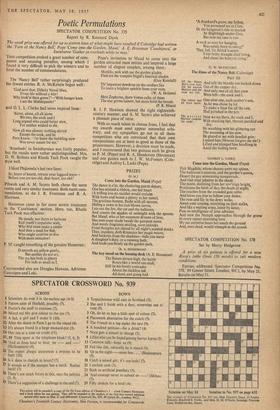Poetic Permutations
The usual prize was offered for up to sixteen lines of what might have resulted if Coleridge had written the 'Yarn of the Nancy Bell,' Pope 'Come into the Garden, Maud,' A. E. Housman 'Casabianca,' or Swinburne 'Gather ye rosebuds while ye may.'
THIS competition evoked a great number of com- petent and amusing parodies, among which I found it very difficult to pick the winners and to limit the number of commendations.
The 'Nancy Bell' rather surprisingly produced the fewest entries. R. A. McKenzie began well : 'God save thee, Elderly Naval Man, From life without a bite!
Why look'st thou green?'—'With hunger keen I ate the Midshipmite!'
and D. L. L. Clarke had some inspired lines :
'Alone, alone, all all alone We two, the cook and I
Long argued who could better stew, For neither wished to die.
Now all was silence; nothing stirred Except the cook, and he Poor knave, ::'er knew the bubbling stew Was never meant for me.'
'Rosebuds' in Swinburnian was fairly popular, but the results were rather undistinguished. Mrs. D. W. Boileau and Rhoda Tuck Pook caught the style well.
I liked Phijomela's last two lines :
So, heart of hearts, retrace your laggard ways— Before you arc too old, dear heart, too old !
Pibwob and A. M. Sayers both chose the same metre and very similar treatment. Both merit com- mendation, as do J. R. Freestone and R. A. Harrison.
Housman came in for some severe treatment in the 'Casabianca' section. Here, too, Rhoda Tuck Pook was effective : He stands, nor dares to harbour Red youth's impulsive wish, Who first must make a cinder And then a meal for fish, Who might contrive to live With more initiative!
P. M. caught something of the genuine Housman : 0 smooth my pillow gently, But mother do not cry, The sea has beds in plenty
For lads as small as I.
Commended also are Douglas Hawson, Adrienne Gascoigne and Loki.
Pope's invitation to Maud to come into the garden attracted most entries and inspired a large number of elegant couplets, among them :
Matilda, seek with me the garden glades; Fled are the vampire Night's funereal shades.
(Guy Kendall) Th' impatient dewdrop on the verdure lies To learn a brighter sparkle from your eyes.
(W. A. Holmes) Here Zephyrus, there Venus calls; of these The star grows fainter, but more bold the breeze.
(P. R. Hines)
R. J. P. Hewison showed the right eighteenth- century manner, and A. M. Sayers also achieved a pleasant piece of verse.
With so much talent to choose from, I feel that my awards must need appear somewhat arbi- trary, and my sympathies go out to all those competitors who are convinced that their own compositions are at least as good as those of the prizewinners. However, a decision must be made, and I recommend that two guineas each be given to P. M. (Pope) and R. A. Henderson (Housman) and one guinea each to J. W. McFeeters (Cole- ridge) and Audrey L. Laski (Pope).
PRIZES
Come into the Garden, Maud (Pope)
The dance is o'er, the chattering guests depart, One has mislaid a ribbon, one her heart (A trifling loss no maiden would reclaim With bows and beaux a-plenty to her name). The gracious hostess, flusht with all success, Hiding a yawn in her last-blown caress, Lets out the fire, the cat and the balloons, And counts the shakes of midnight with the spoons. But Maud, who at her casement dreams of love, Has seen some shade beside the gatepost move And weedy fragrance stealing, soon unlocks Fond thoughts not stirred by all night's scented stocks. Thus, maidens, doth Romance her magic weave, And beckons from the shadows—bids you leave A daughter's duty, or a running bath, And leads you firmly up the garden path.
(R. A. HENDERSON)
The boy stood on the burning deck (A. E. Housman) The flames stream high, the battle Roars like a world run mad; Still lie his lovely comrades About the luckless lad, All dead. and going had.
'A drunkard's grave, my father, You promised me at (inn.
Or the hangman's ride to market At Slightleigh-under-Don, But now my race is run.
A neck so neat for hanging.
Was surely born to swing?' 'Nay, lad, 'tis Africk's ocean Your briny draught shall bring, And cheat the ham:izn string.'
(J. W. MCFEETERS)
The Rime of the Nancy Bell (Coleridge) Part Ill
And still the bloody sun looked down Out of the copper sky;
And only two of all that crew Were left—the cook and 1.
One after one, each mother's son, As he was chose by lot
To make a feast for all the rest, Had perished in the pot.
Now we sat there, the cook and 1, With cracking lips, throats parched and dry.
He watching with his glittering eye The seasoning of his stew.
He glared at me with fiendish grin : 1 seized him (Heaven forgive the sin !) Lifted and plunged him headlong in Amid the boiling brew.
(AUDREY L. LASKI)
Come into the Garden, Maud (Pope) Fair Magdala, whose charms avert my spleen, The ballroom's mistress, and the garden's queen, Desert the gay unmeaning masquerade, And visit your admirer in the shade. The moon, declining from her sov'reign height, Proclaims the birth of day, the death of night; The coaches from the crowded gate retire And leave you free to follow your desire.
The rose and lily in the dewy walks Await your coming, trembling on their stalks, And like a waiting army, lance by lance, Pass on intelligence of your advance.
And now the Nymph approaches through the grove
In every aspect exercising love.
My ear attentive hears her touch the ground And, even dead, would triumph in the sound.
Of the Nancy Bell's crew none but the ancient Mariner and the cook are left.
The others had all been eaten.
The ancient Mariner cooketh the cook!


































 Previous page
Previous page